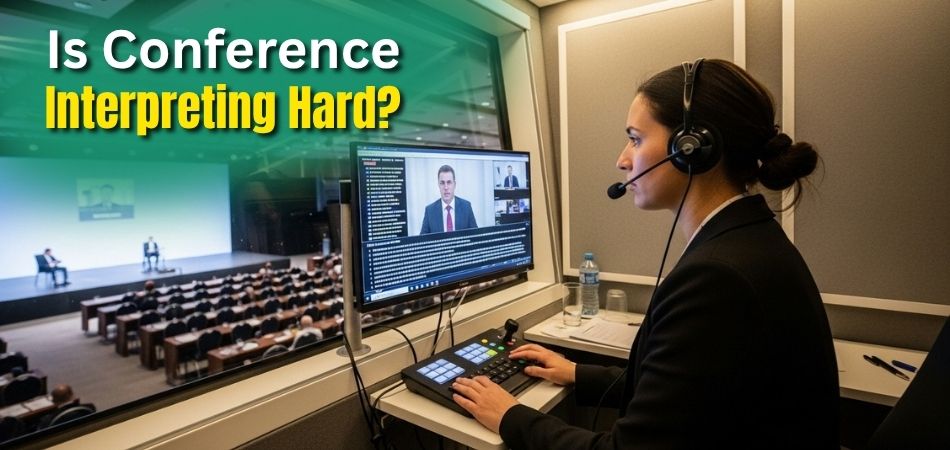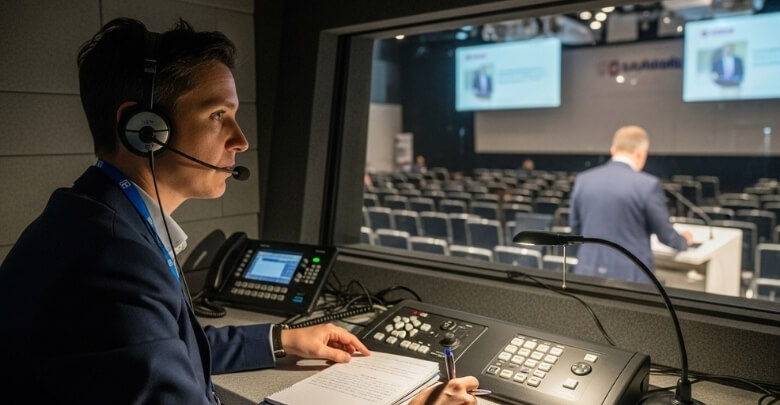A conference interpreter is someone who changes spoken words from one language to another in real time. They work during big events, meetings, or speeches where accuracy matters most. Many people wonder how they do it so fast and smoothly, and some even ask, Is conference interpreting hard?
Yes, conference interpreting is hard. It demands real-time translation, deep concentration, quick decision-making, and mental endurance. Interpreters must listen, process, and speak at once without delay. The role also requires cultural awareness, constant preparation, and calm performance under pressure, especially during fast or high-stakes events.
Do you want to know what makes this job so demanding and how interpreters handle it? Keep reading, because this article explains everything about their skills, challenges, tools, and ways they make tough sessions look easy.
Is Conference Interpreting Hard?
Conference interpreting is one of the toughest language jobs in the world. It needs deep focus and quick thinking at the same time. Interpreters must listen, understand, and speak almost together without delay. If you want to know why it is so hard, the points below explain it all clearly.
Real-Time Processing
Interpreters must listen and translate while the speaker is still talking. They think in one language and speak in another without stopping. This needs very fast mental processing. Even a small delay can change the meaning. It gets even harder in fast or technical speeches, especially for global events like conferences in USA, where clarity matters most.
Intense Concentration
The mind of an interpreter works nonstop during a session. They must focus on listening, speaking, and remembering words all at once. One short distraction can cause mistakes. This level of focus drains energy quickly, which is why interpreters take turns every half hour.
High-Pressure Environment
Interpreters often work in front of large audiences or important people. They cannot pause or ask the speaker to repeat things. Mistakes can cause confusion or even harm the speaker’s message. Staying calm while speaking clearly in stressful settings makes this job even harder.
Many Skills Needed
Knowing two languages is not enough for this job. Interpreters also need strong memory, quick decisions, and cultural sense. They must choose the right words for tone, style, and feeling. A wrong word can change the meaning or offend someone, so accuracy and awareness are key.
Constant Preparation
Before each event, interpreters must study the topic and key terms. They often read reports, speeches, or slides to learn about the subject. If they get the agenda late, they have less time to prepare. Still, they must sound confident and natural while interpreting live.
Mental and Physical Demands
The brain works at full speed during interpretation. After 20–30 minutes, mental energy starts to drop fast. This is why interpreters work in pairs and switch roles often. The job can also cause tiredness and stress if done for long hours without rest.
Conference interpreting is not just about knowing two languages well. It is about using quick thinking and strong focus under pressure. The job needs preparation, teamwork, and mental strength. Anyone who wishes to understand its true difficulty can look deeper into how interpreters train and work.
Skills Required to Handle Conference Interpreting Challenges
Conference interpreting is a tough job that needs strong focus and quick thinking. Interpreters must listen, understand, and translate instantly while keeping the meaning and tone right. It takes skill, control, and mental strength to do it well. These are the skills required to handle conference interpreting challenges.
- Listening Skills: Interpreters need to understand every word clearly while the speaker talks. They must focus deeply and ignore background noise to keep up without losing any meaning or detail.
- Quick Thinking: They must process ideas and translate them instantly. Choosing the right words fast helps them stay in rhythm with the speaker’s flow during the session.
- Strong Memory: Remembering parts of speech while translating the next is hard. Interpreters depend on short-term memory to maintain accuracy and the full meaning.
- Language Mastery: Knowing both languages deeply is key. They must understand grammar, tone, slang, and cultural hints to make translations sound natural and respectful.
- Mental Focus: Interpreting needs full concentration at all times. The brain works nonstop to listen, think, and speak, so staying alert is very important to avoid errors.
- Cultural Awareness: Interpreters must be aware of cultural meanings and expressions. This helps them choose words that match the speaker’s intent and prevent confusion or offense.
- Emotional Control: Stress and pressure are common in interpreting. Staying calm and steady helps interpreters handle tough topics while keeping accuracy and proper tone.
Conference interpreting is not just about words. It’s about carrying feelings, ideas, and intent from one language to another. With practice, focus, and emotional balance, interpreters can handle challenges and make sure messages are shared clearly and correctly.
How Experience Makes Conference Interpreting Easier Over Time?
Interpreting at conferences takes quick thinking and strong language skills. At first, many interpreters find it hard to keep up with fast speakers. But over time, regular practice helps improve focus and speed. Keep reading to learn how constant learning and growing confidence make interpreting smoother and easier.
Builds Better Listening Skills
With practice, interpreters learn to catch meaning even in fast talks. They start to pick key ideas instead of getting lost in every word. This helps them keep pace with complex speeches. Over time, they learn to listen actively while speaking clearly at the same time.
Improves Memory and Focus
Regular interpreting helps the brain hold and recall short bits of information quickly. Interpreters get better at remembering key terms and phrases during long sessions. Their focus also sharpens, allowing them to work under pressure. With daily effort, they can translate ideas smoothly without losing track.
Expands Knowledge of Topics
Each new event teaches interpreters about new fields and subjects. The more they interpret, the more topics they become familiar with. This wide knowledge helps them stay calm even in unfamiliar settings. With time and regular practice, interpreters not only handle complex sessions more confidently but also see steady conference interpreter career growth through experience and exposure to diverse events.
Boosts Confidence and Calmness
Confidence plays a big role in interpreting success. After many sessions, interpreters learn how to stay calm even when faced with fast or unclear speakers. They trust their skills more and speak with ease. This calmness helps them deliver accurate and natural translations.
Strengthens Team Coordination
Conference interpreting often involves teamwork with other interpreters. With experience, they learn how to switch smoothly and support each other. They also get used to the rhythm of sharing tasks. This teamwork helps keep the translation flow steady and professional.
Experience makes interpreting smoother and more enjoyable over time. Every event brings lessons that build both skill and confidence. The more interpreters practice, the easier the work becomes. With patience and effort, they turn complex interpreting sessions into confident performances.
Why Preparation is Key for Conference Interpreting Success?
Good preparation makes a huge difference in conference interpreting. It helps interpreters understand the topic and stay confident during live sessions. With solid prep, interpreters can keep up with fast speakers and complex subjects. Let’s look at how simple steps can make this work better in real situations.
Research Builds Confidence
Learning about the event topic helps you feel ready and calm. When you know what will be discussed, you can understand ideas faster and translate clearly. It also helps you spot key terms and speaker styles early. This makes live interpreting smoother and less stressful for you.
Learning Vocabulary Makes Work Easier
Every event has special words and phrases people often use. By learning these ahead of time, you avoid confusion during the session. Knowing the right terms helps your translation sound natural and correct. It also shows that you are well-prepared and professional in your work.
Reviewing Speaker Material Saves Time
Reading slides, notes, or speeches before the event helps a lot. You can guess what speakers will say and prepare matching words. This reduces the risk of missing key points or making mistakes. It also helps you keep up with the speaker’s tone and pace easily.
Practice Helps You Handle Pressure
Practicing topics and vocabulary builds your memory and speed. It helps you respond quickly without stopping to think too long. The more you rehearse, the more natural your speech will sound. With steady practice, you can handle even tough conferences smoothly.
Preparation Improves Overall Performance
Proper preparation is one of the most important steps to become a conference interpreter, as it helps you build strong language skills, learn industry terms, and handle real-time translation with confidence. A prepared interpreter makes fewer errors and stays calm under pressure. Preparation is the key to doing your best work every time.
Good preparation is not just about reading notes. It’s about understanding topics, speakers, and event goals. These steps help you deliver smooth and accurate interpretations. With steady effort, you can grow your skills and succeed in every conference.
How Technology Supports Interpreters During Difficult Sessions?
Technology plays a big role in helping interpreters do their work well. It makes their job easier and smoother during fast events. With the right tools, they can stay focused and clear even under pressure. Let’s look at how different tools support interpreters during tough sessions.
Headsets Help With Clear Listening
A good headset lets interpreters hear every word without outside noise. It blocks sound from the crowd and keeps the speaker’s voice clear. This helps them understand words better and avoid mistakes. Many headsets also have volume control, so interpreters can adjust sound levels as needed.
Booths Create a Quiet Space
Inside soundproof booths, interpreters can focus without distractions. These booths block outside noise and give them a peaceful space to work. They also have microphones and audio systems for clear speech delivery. The booth design helps interpreters work smoothly during big events or long meetings.
Apps Make Work Easier
Modern apps help interpreters connect with teams and follow schedules. Some apps also share event materials or glossaries before the session. Others provide live text or notes to help with accuracy. These apps make it easier for interpreters to handle busy or changing events.
Remote Interpreting Platforms
Online platforms allow interpreters to work from anywhere in real time. They can see and hear the speaker clearly using video and audio tools. This setup is useful for global meetings and online events. It saves travel time and helps interpreters join more sessions easily.
Recording and Feedback Tools
Technology also helps interpreters improve their work after each session. They can record and replay their performance to check for errors. Feedback tools help them understand where they can do better. This helps them stay sharp and grow their skills with each event.
Technology gives interpreters the support they need in fast, busy events. From clear sound to quiet spaces, each tool helps them stay focused. It keeps communication smooth even when sessions get tough. These modern tools make interpreting easier and more accurate for everyone involved.
FAQs About Is Conference Interpreting Hard?
Conference interpreting can sound simple at first, but many people don’t realize how complex and detailed it really is. Below are some common questions that help explain what makes this job special, what skills it needs, and how interpreters manage their work effectively.
What Makes Conference Interpreting Different From Normal Translation?
Conference interpreting is done in real time while someone is speaking, unlike normal translation, which happens after reading or listening to the full message. Interpreters must think, understand, and speak almost at the same time. It needs quick reactions and full focus. This makes it much more challenging than translating written text.
Why Do Interpreters Need to Work in Teams During Conferences?
Conference interpreters usually work in pairs or groups because the work is very tiring. Each interpreter can only work for around 20 to 30 minutes before switching. This helps keep their mind fresh and avoids mistakes caused by mental fatigue. Teamwork also helps maintain the same quality and tone throughout the session.
How Do Interpreters Handle Unfamiliar Topics During Conferences?
When interpreters face a new or unfamiliar topic, they use their research and general knowledge to understand key points. They focus on meaning rather than every word. If they know the subject in advance, they prepare by reading related material. Staying calm and using context clues helps them manage tough topics effectively.
What Happens If an Interpreter Mishears a Word During a Session?
If an interpreter mishears something, they quickly use context to correct or rephrase the meaning. They do not stop or panic, because the speech must continue smoothly. Their training helps them fill small gaps without breaking the message flow. Staying confident and focused allows them to fix mistakes naturally.
How Do Interpreters Keep Their Energy and Focus During Long Conferences?
Interpreters take short breaks and rotate often to rest their minds. They drink water, stretch, or take deep breaths between sessions. Good sleep and healthy eating before work also help them stay alert. Staying focused is key because even small distractions can affect performance.
What Qualities Make Someone a Good Conference Interpreter?
A good interpreter has strong listening skills, fast thinking, and a deep understanding of both languages. They stay calm under pressure and can handle different accents or tones easily. Confidence and politeness are also important when speaking in front of others. These qualities help them deliver messages smoothly and clearly.
How Do Interpreters Deal With Speakers Who Talk Too Fast?
When a speaker talks very fast, interpreters focus on the main ideas instead of every single word. They summarize important points while keeping the meaning accurate. With experience, they learn how to catch phrases quickly and speak at a steady pace. This skill helps them keep up without losing clarity.
What Kind of Training Do Conference Interpreters Need?
Most conference interpreters take special courses or attend language programs that focus on interpreting skills. They learn how to listen, think, and speak at the same time. Training also includes memory exercises, speech practice, and voice control. This helps them work better under real-life conference pressure.
Can Conference Interpreting Be Done Remotely?
Yes, many interpreters now work online using video or audio tools. Remote interpreting lets them join global meetings from home or offices. It saves travel time and gives more work chances. However, they need a quiet place, strong internet, and good equipment for clear communication.
Final Words
Conference interpreting takes real skill, focus, and mental strength. It needs quick thinking, deep listening, and strong preparation to perform well. With time, practice, and calm control, interpreters can manage even the toughest events easily. So, the short answer to this is conference interpreting hard? Yes, it is—but with effort, it becomes smoother and easier.
To do well in this field, practice daily, stay calm, and always prepare before every session. Keep learning new topics, take short breaks, and protect your health. Every small step builds skill and confidence. Keep growing, stay patient, and all the best for your interpreting goals.








